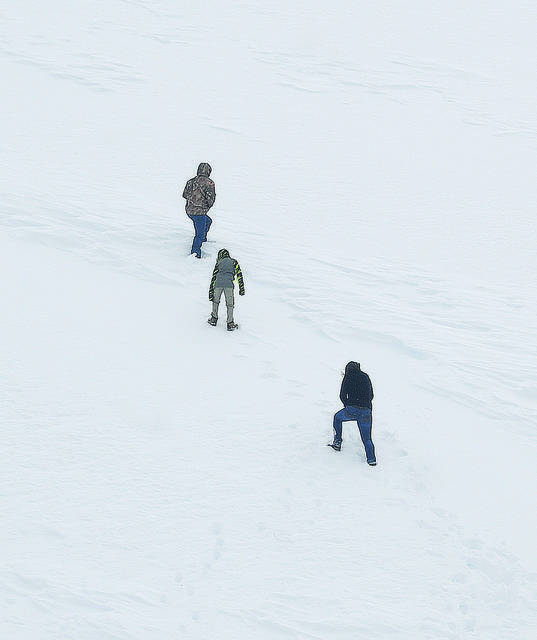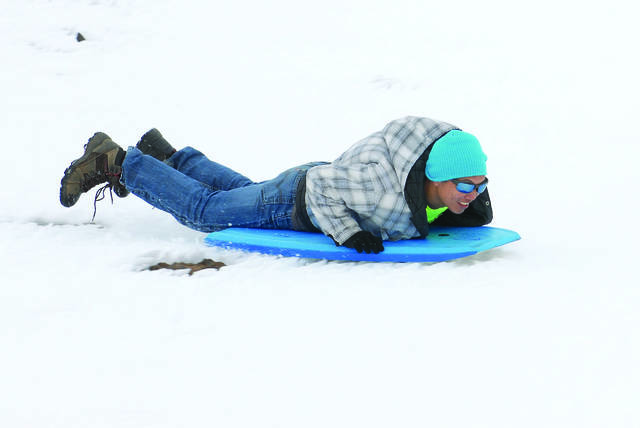Input sought for proposed Maunakea rules

Visitors to the summit of Mauna Kea chimb a hill on Friday. (Laura Ruminski/West Hawaii Today)

CJ Kow slides down a hill on Maunakea. (Laura Ruminski/WHT FILE)
KAILUA-KONA — Residents will get a chance to weigh in later this month on proposed rules for public and commercial activities at Maunakea lands managed by the University of Hawaii.
KAILUA-KONA — Residents will get a chance to weigh in later this month on proposed rules for public and commercial activities at Maunakea lands managed by the University of Hawaii.
The university is hosting a series of public hearings throughout the state toward the end of the month to collect input from the public on those rules, which govern everything from snow recreation to commercial access. One of two Hawaii Island hearings will take place 6:15-8:15 p.m. Sept. 26 at Waikoloa Elementary and Middle School.
Testimony received will be considered as the rules are finalized. They’ll then go to the university’s Board of Regents for a decision-making meeting, which will also take public testimony.
Should the rules be approved at that level, they will continue through the administrative rules process for final review and approval by the governor.
The rules as drafted were developed through a series of meetings and events in coordination with the state Department of Land and Natural Resources as well as the Office of Hawaiian Affairs and the Small Business Regulatory Review Board.
The rules cover public and commercial activities on Maunakea lands, what the rules refer to as “UH management areas,” and are intended to further the protection of cultural and natural resources in those areas and ensure the health and safety of the public.
UH management areas refers to the 11,288-acre Maunakea Science Reserve, the 19-acre site of the Hale Pohaku Visitor Information Station and the 723-acre management corridor that includes the summit access road that runs up from the visitor information station. The 3,894-acre Maunakea Ice Age Natural Area Reserve falls under the DLNR.
In addition to rules covering general access to particular sites, particularly cultural features and natural resources, the rules also address commercial and recreational activities at Maunakea.
The proposed rules don’t outright ban “snow play” activities like skiing, snowboarding and sledding, saying instead such activities “may be restricted” for safety reasons or prevent damage to resources and “may be prohibited in specific designated zones” for the same reasons.
The operation of vehicles like snowmobiles or use of a motorized vehicle to tow people on skis or sleds would be prohibited, as would formally and informally organized snow recreation contests and snow play tours.
The proposed rules would also prohibit camping within the UH management areas as well as the illicit use of drugs, smoking/tobacco use and use or possession of alcohol in public areas.
The rules would also allow for the installation of a gate or other method of controlling access upon the Board of Land and Natural Resources’ approval. The rules would allow a designee by the university president to close or limit access to all or parts of the management areas when necessary, such as bad weather, construction or maintenance activities near roads or observatory sites and traffic congestion.
The draft rules include a subsection noting the proposed chapter is subject to “the right of native Hawaiians to exercise protected customary and traditional rights,” as outlined in the state constitution and no permit or approval would be required for the exercise of customary and traditional rights for practices that have no or minimal impact on cultural, natural or scientific resources. The Office of Maunakea Management is also required by the draft rules to help applicants and allow protected practices “to the greatest extent possible.”
The rules also include an explicit allowance for the scattering of cremated human remains within the management areas.
The proposed rules would require a written permit for any commercial activities, such as tour or film/recording activities, within the management areas. Permits would also be required for groups larger than 10, public assemblies and research.
Violation of the rules could carry a range of penalties from immediate expulsion from the management areas to permit revocation to an administrative fine.
Fines could range from no more than $2,500 for a first violation to no more than $10,000 for a third violation in a span of five years.
While the rules as drafted do not themselves create any fees, the proposed rules would allow the university board of regents to establish fees to be charged for permits, parking, entrance and use of any facilities.
In addition to providing testimony in person at one of the public meetings, input is also being accepted online at the university’s government relations website — www.hawaii.edu/govrel/uhhar-testimony — emailed to uhhar@hawaii.edu or via writing and mailed to the UH Government Relations office.
A link to a PDF of the proposed rules is available at https://bit.ly/2PAGrwA.



Hawaii is where freedom goes to die!